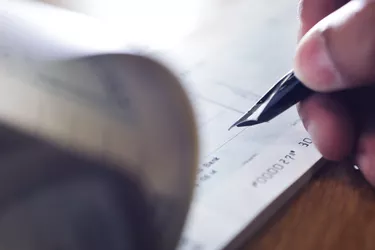
If you are self-employed or own a small business, you may still use your personal checking account for your business. While this is not unusual, you might run into difficulty if a client or customer sends you a check payable to a business name rather than your full legal name. If your bank refuses the deposit, you may have to either update your account with your business name, cash the check at its issuing bank or open a business account.
Business Organization Basics
Video of the Day
When it comes to money management and bank accounts, the type of business you own matters. If you are operating a sole proprietorship, it may be possible to add your business name to your personal checking account. However, if you are operating as a corporation or a limited liability company (LLC), your business is a separate entity and must have its own accounts.
Video of the Day
Business Names and DBA Statements
As Cornell Law School's Legal Information Institute notes, DBA statements are a consumer protection measure that allows the public to know who operates a business. If your sole proprietorship is operated under your own name, you should be able to deposit a business check into a personal account. If you have a separate name for your business, on the other hand, you may need to legally file what is called a DBA or a "doing business as" statement in your state before you can add your business name to your personal account or open a separate business account.
Example
You own a catering business that is not incorporated and is licensed and registered as a sole proprietorship. You opt to call your business "Culinary Delights Catering." Your state may require you to file a DBA statement that provides the name of your catering business along with your full name and an address where you can be contacted or served with legal papers. Your DBA statement can also help you add your business to your current bank account or open a new one exclusively for your business.
Modifying Your Current Account
If you have been given a check made payable to your sole proprietorship and you don't yet want to open a business account, you may be able to ask your bank to allow you to add your DBA to your bank account. Be prepared, however, for your bank to ask you to provide your business license and registration, as well as your DBA statement.
Visit the Issuing Bank
Look to see which bank the check is drawn on. If there is a branch of that bank in your area, you could go to the bank and ask a teller there to cash it for you. As Bankrate states, banks aren't required to cash the check for you, but some will. Expect to pay a fee, however, and show government-issued identification.
Open a Business Account
The Small Business Administration strongly urges business owners to open a separate business banking account. The reasons for doing include:
- Increased professionalism: Clients and customers may feel more confident writing a check to a business name instead of a personal name. Not having an account in your business name might give the impression that your business is just a side gig or hobby.
- Streamlined accounting: It's easier to manage your business and personal finances if you keep your funds separate. This is particularly true at tax time when you will need to sort out your deductible expenses.
- Protecting funds: If your business is targeted in a lawsuit, keeping your personal funds separate from your business account can protect your personal funds from being seized to satisfy a court judgment.
If you are already receiving checks made out to your business, it's probably time that you opened a business account. Both traditional and online banks offer such accounts and many are tailored to small, independent businesses. There are a number of great small business banks, too, and the best business account banks will vary depending on your needs and preferences. Each bank sets its own requirements, but you should expect to provide your DBA statement, Employer Identification Number (EIN), business license or registration, as well as personal identification so that your bank knows who is managing the account.